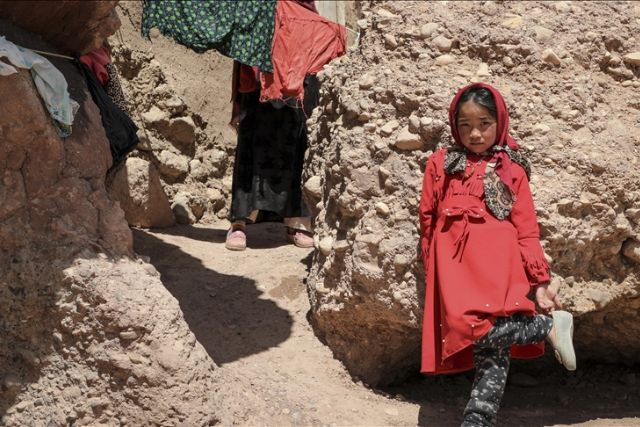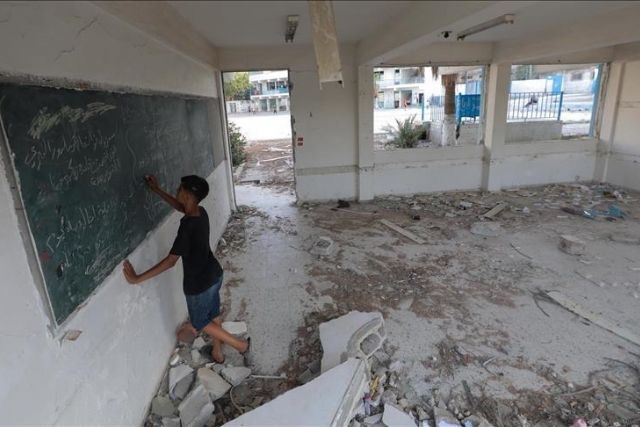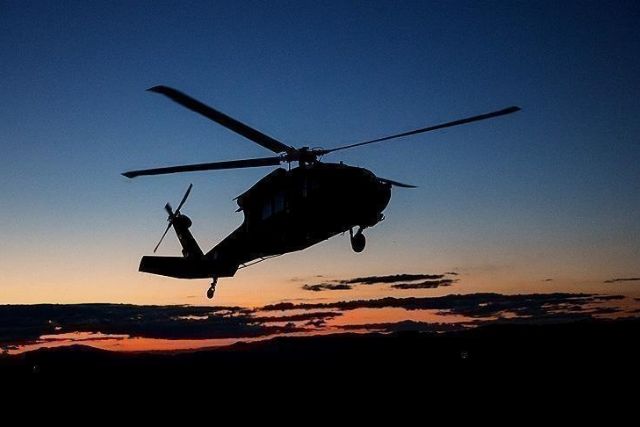Afghan girls turn cave into school, raise hope for children
Girls age 18 and 19 set off every day regardless of adverse weather, and teach Persian, English, mathematics, geography, painting to children

KABUL, Afghanistan
Afghan girls who educate the children of poor families living in caves in a classroom in Bamyan, one of Afghanistan's most deprived provinces, instill hope for the future of the children.
Ruya Serferaz (18) and her English class friend Besbegum Havari (19) set off every day regardless of adverse weather conditions, and teach Persian, English, mathematics, geography, and painting to children in a cave that serves as their classroom, two hours from their home.
The two friends, with the help of the children, cleaned the cave they have turned into a classroom, decorated the walls with various handcrafts made of painting, calligraphy and paper, making it a glimmer of hope for the future of helpless and poor families.
Boys and girls, age four to 15, repeat what their teachers taught them in unison and write down what they learned that day in their notebooks.
When asked about what occupation they would choose, the answer is either a teacher, a doctor or a pilot.
Students cannot go to public schools
Located about four hours west of the capital Kabul, Bamyan is among the most deprived areas of Afghanistan. The province, the majority of which is composed of Shia Hazaras, is far behind many provinces in terms of literacy rate.
The deepening humanitarian crisis in the country affected poor families the most, as the Taliban came to power in Afghanistan in August 2021, and the international aid on which the country had been heavily dependent until then, was cut off.
Many families in Bamyan, unable to even meet their basic needs, live in caves along the mountains in the Taibuti region, where Buddha statues were destroyed by the Taliban in 2001.
Many of those who work in jobs that require physical strength complain of not being able to find a job as before.
According to the UN data, 28.3 million people in Afghanistan, which has a population of around 40 million, are in need of urgent humanitarian aid. Among these people, women and children constitute the most vulnerable group.
In Afghanistan, where the turbulent political and economic crisis that has been going on for many years has had a deep impact, millions of children belonging to such families are also deprived of going to school.
Education interrupted by Taliban
The high school education of the children's volunteer teachers, Serferaz and Havari, was interrupted when they were in the 11th grade, when the Taliban came to power in the country and then banned girls from going to school.
Serferaz and Havari come to the cave in the Taibuti region every day to give lessons to the children.
The cave, attached to a wall with mud bricks from the exterior and its ceiling closed with planks, today serves as an education center where they contribute to the society they live in.
Serferaz also teaches English, which she learned through her own efforts and speaks fluently, among other subjects.
She said there were around 80 students in total on different class days and noted that the children received training for three to four hours every day.
Noting that they started teaching here six to seven months ago, Serferaz said: "We come here every day except Friday. We have turned this place into a school. Students study here completely for free. The people here live in very bad economic conditions. They can't pay and that's why we don't ask for any payment."
Expressing that her students were very interested in the lessons and showing the paintings and handicrafts with various figures such as flowers, trees, and rainbows hung on the cave wall, Serferaz also said: "These are beautiful paintings. They reflect the wishes of the students.
"These handcrafts they make from paper also show that they have a special interest. I see a very special motivation in them. Despite their young age, they are very talented. They are very interested in painting and calligraphy lessons. They work really hard."
Noting that they have not received any help so far, Serferaz said: "We are only two people. It would be great if we received any aid. Because students need books, pencils, and notebooks. I cannot afford them alone." said.
'Future belongs to children'
Havari said their most important motivation is that the children are not deprived of education.
She added that she is looking forward to the day she will continue her education as well.
"There are some of my students who want to become pilots or ones that have different goals. I will be very happy to see them advance their careers in the future,” she said, adding that she particularly focuses on literacy lessons so that children can express themselves well.
“I am happy that my students have goals. Because there is no difference between children living in caves or palaces. The future belongs to children,” she stressed.
One of the students, 12-year-old Merina Emiri, said: "I am very happy with my teachers. They come to our house and give training by making sacrifices. Since our schools are closed, we have no place and opportunity to get another training. I want to be a pilot in the future."
Mustafa Hossaini (12), another student, said he wants to become a doctor in the future and treat people living in caves like themselves.
Volunteer teachers also told Anadolu that the education of children living under difficult conditions makes their mothers very happy.
Many of the children living in the area are also among those who cannot go to school. The school is both far away and they cannot afford basic necessities such as backpacks, notebooks, pens, and books.
*Writing by Emre Basaran in Istanbul





